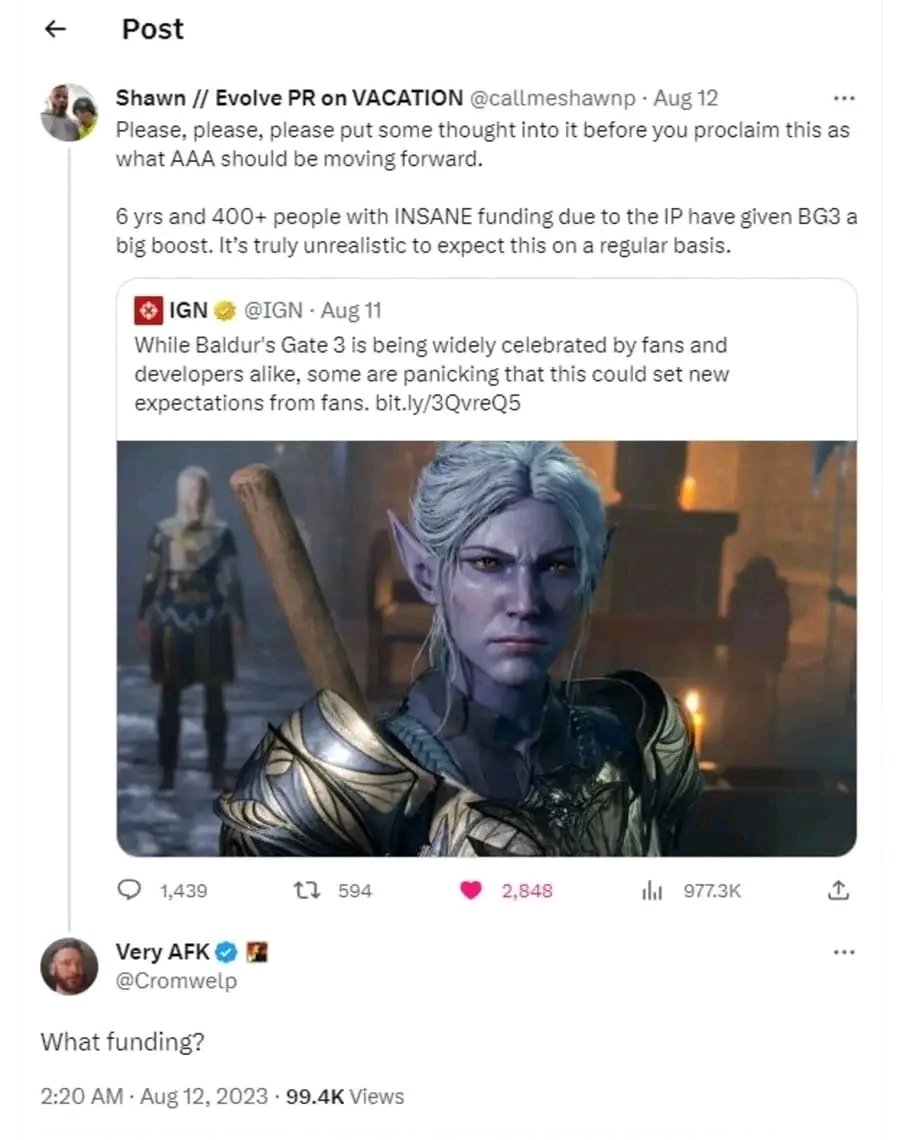this post was submitted on 16 Aug 2023
1383 points (96.2% liked)
Games
38755 readers
1317 users here now

Welcome to the largest gaming community on Lemmy! Discussion for all kinds of games. Video games, tabletop games, card games etc.
Weekly Threads:
Rules:
-
Submissions have to be related to games
-
No bigotry or harassment, be civil
-
No excessive self-promotion
-
Stay on-topic; no memes, funny videos, giveaways, reposts, or low-effort posts
-
Mark Spoilers and NSFW
-
No linking to piracy
More information about the community rules can be found here and here.
founded 2 years ago
MODERATORS
you are viewing a single comment's thread
view the rest of the comments
view the rest of the comments

That's a valid point. As long as there's a publisher and investors we're more than likely never going to see what I suggested, I kinda forgot star citizen is what it is because it's funded by us.
It's always the same crunch time for employees and rushed buggy products to feed the investors from "AAA" corps. Hope we can push for some positive change :/
I can't understand why crunch time has become so normalised. There's no other software development project where constantly failing to plan for the needed time requirement would be accepted. Crunch is a sign of bad project management, it isn't normal.
But when it works, when that day comes, we’ll make a hell of a lot of money for the shareholders! Isn’t that nice?
At some point, people figured out that during a couple of weeks of mad rush right before a deadline, if you've got committed, well-rested employees who know they're going to get a rest afterwards, they tend to be much more productive than they normally are. Some bad managers only paid attention to part of that, and determined that eighty hour weeks are more than twice as productive as forty hour ones, and intentionally started inducing crunch. They somehow didn't notice that the third week of crunch is only about as productive as a regular week, and after that, it's way less productive as everyone's exhausted. Combine this with the fact that people with management knowledge tend to flee from the games industry rather than to it, and you end up with the software engineering industry's least effective managers running things with easily debunked dogma.
The main differences with Star Citizen are that it's
This means, CIG has no pressure to ship soon or even at all (if the project fails, they have no liability). They also have nobody telling them what to with the money. They have already made their profit.
I am not knocking CIG for this situation, but if you put it like this, it's easy to see why for each CIG out there, there are tens of thousands of games on crowdfunding sites that either
So as a general business model rather than just an insane stroke of luck, I don't think this is a good option.
A business model that only earns money after release (like the classic publisher-funded development model) is bad for the obvious cash-grabby and buggy reasons, but at least it consistently delivers games. Contrary to the "earn money before you start development" model that is enabled by crowdfunding, which in general does not deliver games.
In my (not very educated) opinion, early access is probably the best middle ground. You start off with little initial funding required, but by the time you turn to the crowd, you already have a working prototype and company structure. That makes it much more likely for the game to eventually be released in a full version. This option obviously comes with its own downsides as well, but many of my favourite games have been small studios or even individuals who use early acces to fund development.